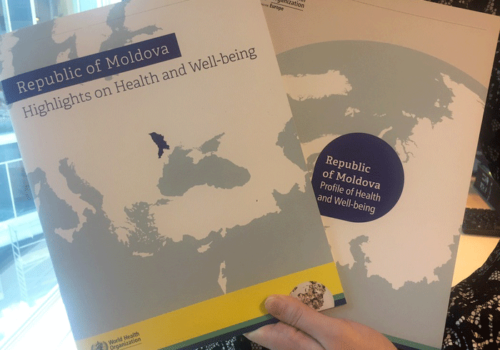WHO/Europe has launched the third in a series of publications providing in-depth analyses of health situations in Member States. Focused on the Republic of Moldova, the report reveals a health situation that has improved significantly in the last decade but still faces considerable challenges.
 The report, entitled “Republic of Moldova. Profile of health and well-being”, was written in collaboration with the country’s Ministry of Health and used indicators from the European health policy framework Health 2020 to provide insights into performance against Health 2020 targets and indicators. It is accompanied by a succinct “Highlights on health and well-being”, a summary designed for policy-makers. This summary pinpoints key policy issues and trends, and provides an analysis of available information and evidence related to the health situation of the country.
The report, entitled “Republic of Moldova. Profile of health and well-being”, was written in collaboration with the country’s Ministry of Health and used indicators from the European health policy framework Health 2020 to provide insights into performance against Health 2020 targets and indicators. It is accompanied by a succinct “Highlights on health and well-being”, a summary designed for policy-makers. This summary pinpoints key policy issues and trends, and provides an analysis of available information and evidence related to the health situation of the country.
Improving trends
Life expectancy in the Republic of Moldova has now reached 72 years, which is 1.5 years above the average for the Commonwealth of Independent States (CIS). Improved trends have been observed for 10 out of the 19 core indicators for Health 2020 targets since 2000. Premature mortality rates for the 4 major noncommunicable diseases (cardiovascular disease, cancer, diabetes mellitus and chronic respiratory diseases), as well as for diseases of the digestive system, have fallen more quickly than the Health 2020 targets specify. Immunization rates have increased for measles and rubella. Life satisfaction, a measure of subjective well-being, was shown to be in line with the CIS average.
Facing considerable challenges
Alongside improvements in the health situation, however, the Republic of Moldova still faces considerable challenges. Although premature mortality has improved, mortality from cardiovascular diseases is nearly twice as high as the regional average. Mortality from cancer is also increasing in contrast to downward trends in most European countries. Noncommunicable diseases cause more than 3 out of 4 deaths in the Republic of Moldova, and infectious diseases, especially tuberculosis, still represent a significant burden.
Several other indicators show rising trends: the prevalence of overweight and obesity, the proportion of children of official primary school age not enrolled in school (an indicator for well-being), and the proportion of private household’s out-of-pocket expenditure on health. Polio immunization has decreased.
Dr Claudia Stein, Director of the Division of Information, Evidence, Research and Innovation commended the publication: “This report shows that the hard work of public health authorities and health care workers in the Republic of Moldova is paying off, and there have been significant improvements. Of course, there is still much work to be done, but seeking to better understand the present through a report like this is an important element of success in the future.”
More country profiles to come
Previous reports were published on Greece and Slovenia. Over the coming years, WHO/Europe will produce these detailed country profiles for as many Member States as possible, describing national health situations using the latest data available. These data are analysed in conjunction with those of other countries in the WHO European Region in order to create meaningful comparisons.
The reports are available via the European Health Information Gateway and its accompanying European health statistics app, where data sets can be explored in more detail and in comparison with other countries.


 ПОИСК ПО САЙТУ
ПОИСК ПО САЙТУ  поиск по ресурсному центру
поиск по ресурсному центру 



